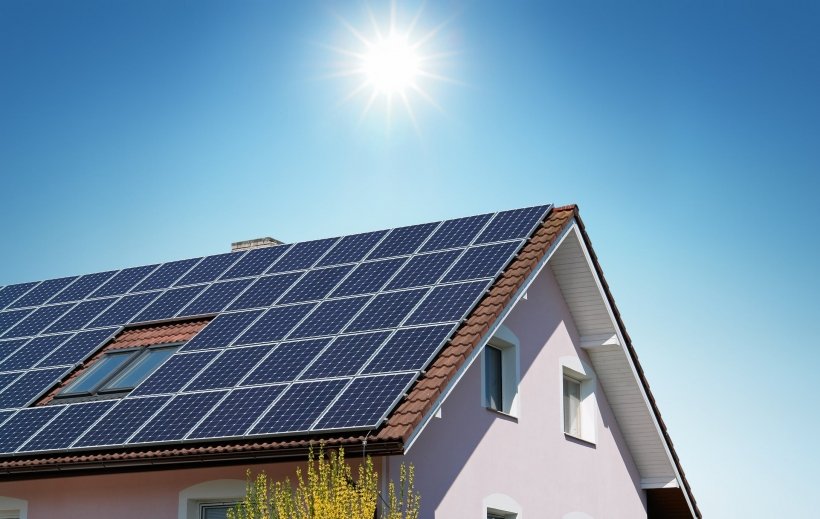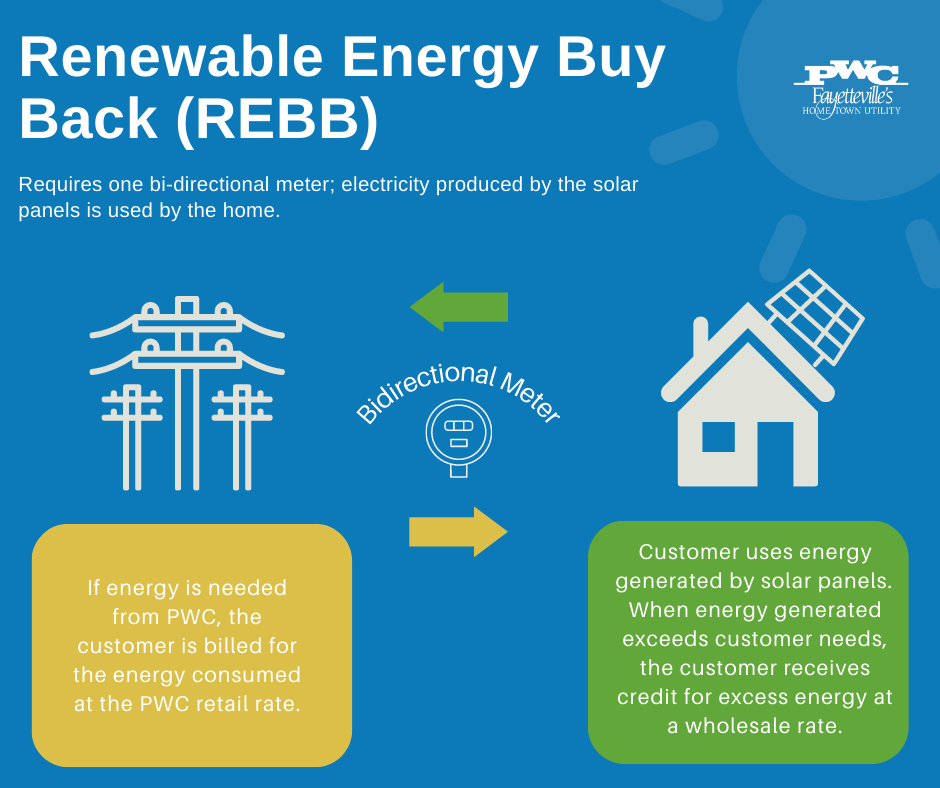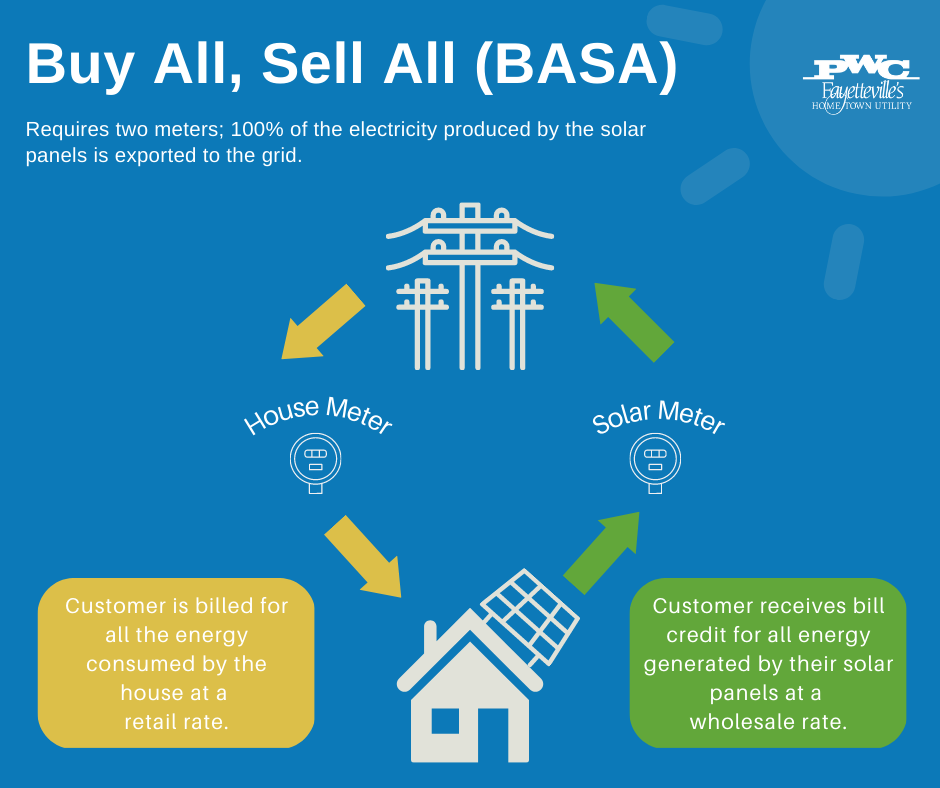Rooftop Solar
Rooftop Solar panels convert sunlight into electricity for your home by using photovoltaic (PV) cells. PWC offers two renewable energy rate options.
Before you make a commitment or sign an agreement with a solar contractor, please contact us at (910) 223-4950 or solar@faypwc.com to discuss which option is best for you.
A solar contractor can guide you through the installation process, but it’s a good idea to familiarize yourself with the information provided below, including the application process and permitting requirements.
- PWC Application Process for Solar Panel Installation
- PWC Standard Interconnection Agreement
- City of Fayetteville Solar Panel Requirements
What are PWC’s renewable energy rate options?
PWC currently offers a Buy All, Sell All option and the new Renewable Energy Buy Back Rider option will be available May 1, 2023. PLEASE NOTE: PWC does not endorse, promote, or prefer any specific service or installer.
Renewable Energy Buy Back (REBB) Rider
Available to solar electric renewable generation of 10 kW or less.
- REBB Rider
- Available to solar electric renewable generation of 10 kW or less
- Requires 1 meter (bi-directional) at the applicable basic facility charge
- Allows for home or business to utilize energy generated by solar equipment first and exports excess to PWC’s electric grid
- Customer receives monthly bill credit for all exported energy
- Customer credit shall not exceed the total current kWh energy charges on the monthly bill
- Excess production does not carry forward to the next month’s bill
Buy All Sell All (BASA)
Required for any solar electric renewable generation over 10 kW
- BASA Rate
- Required for any solar electric renewable generation over 10 kW
- Requires 2 meters at the applicable basic facility charge
- Customer is billed for all energy consumed during billing period on the applicable service rate
- Customer receives credit for all energy generated at BASA customer credit rate
- Customer credit shall not exceed the total current kWh energy charges on the monthly bill
- Excess production that cannot be credited during the billing period does carry over and will be applied to future month’s energy charges
- Existing customers on the BASA rate can remain on this rate or choose to reconfigure their solar system for the new Renewable Energy Buy Back (REBB) Rider rate
Once you choose the PWC rate option that is right for you, there are several things to consider. Scroll down for more information and tips on how to proceed.
PLEASE NOTE: There are many things to consider when deciding to install solar panels at your residence. PWC encourages you to thoroughly research your options and steps to install panels prior to signing any contracts. There are many resources available, including the ones listed here, to help you make the right choice for your home. PWC is providing this list for informational purposes only and does not endorse, promote, or prefer any specific service or installer.
If you decide rooftop solar isn’t an option for you or you don’t own your home, you can still benefit from solar energy. PWC Community Solar allows homeowners and renters to benefit from a single, shared solar array that is located at PWC’s Butler-Warner Generation Plant.
What do I need to know before considering rooftop solar?

Is my home suitable for solar panels?
Solar panels are built to work in all climates, but there are several things to consider before installing them on your home:
- Do trees near your home create excessive shade on your roof?
- Will the size and shape of your roof support solar panels?
- What direction does your house face? Typically, solar panels perform best on south-facing roofs.
- What is the slope of your roof? Typically, a slope between 15 and 40 degrees works best.
- How old is your roof and how long until it needs replacing?
- Do solar panels affect your homeowner’s insurance?
For more information about the basics of solar energy, your solar options, and questions to ask solar professionals:
- Residential Consumer Guide to Solar Power (Solar Energy Industries Association)
- Homeowner’s Guide to Going Solar (Department of Energy)
Find a Solar Provider/Installer
Selecting the right contractor is one of the most important decisions you make during the rooftop solar installation process. Best practice is to get more than one quote from experienced contractors, all with the same project specifications. Below are some tips and resources to help you find, compare, and select the right contractor for your project.
- Recognizing Solar Sales Scams (Better Business Bureau)
- Mapping Service (EnergySage)
- Global Certification List (The North American Board of Certified Energy Practitioners)
- Choosing a Solar Installer (GW Solar Institute)
- Consumer Solar Checklist (Interstate Renewable Energy Council)
- Key Things to Look for in a Solar Quote (EnergySage)
- Solar Customer Resource Portal (Solar Energy Industries Association)
These solar installers are considered knowledgeable of PWC’s process and expected to be in compliance with PWC standards. PWC is providing this list for informational purposes only and does not endorse, promote, or prefer any specific service or installer. Companies that are interested in being added to this list can contact PWC at (910) 223-4950 or solar@faypwc.com for more information.
- Beam Solar
- Blue Raven
- Byld Better
- Cape Fear Solar Systems
- Freedom Forever
- GAF Energy
- Go Solar Power
- Lumina Sun
- NC Solar Now
- Powur
- SolarTyme
- Titan Solar Power
- Top Tier Solar Solutions
The Solar Energy Technology Office (SETO) also offers mapping services that can provide you with quotes from pre-screened solar providers in your area. It’s important to thoroughly read reviews of solar companies to make sure you are selecting the best fit for you and your home.
Financing & Incentives
Federal and State incentives are available.
- Homeowner’s Guide to Solar Financing (Clean Energy States Alliance)
- Rooftop Solar Financing 101 (GW Solar Institute)
- Rooftop Solar Financing (GW Solar Institute)
Permitting & Application Process
Your solar contractor will guide you through the installation process. Most solar contractors manage the solar permitting process for their customers. After your system passes final inspection and you have permission to operate from PWC and the City of Fayetteville, your utility bill will reflect that you are a solar customer.
- PWC Application Process for Solar Panel Installation
- PWC Standard Interconnection Agreement
- City of Fayetteville Solar Panel Requirements
Need Assistance?
If you are unsure of eligibility requirements, terms and conditions, or just have additional questions about PWC’s solar options, we encourage you to contact a Customer Programs Specialist at (910) 223-4950 or email solar@faypwc.com.
Frequently Asked Questions
Do I need to contact PWC prior to purchasing solar panels?
Yes, it is important to contact your utility company first so you can understand how rooftop solar works for PWC customers before signing an agreement with a solar provider.
How do I know what the steps are to getting solar panels installed?
PWC’s website – FayPWC.com/Rooftop-Solar – has information and resources that may help you through this process, including application steps, PWC’s standard interconnection agreement, and the City of Fayetteville’s solar panel requirements.
Does PWC offer solar panel installation?
No. Homeowners will hire a solar provider to install their panels. Before having panels installed, it is important to contact PWC to find out which rate is best for you.
How do I know which installer to choose?
Many resources are available online, including those on the PWC website, to help you make the right choice for your home. PWC provides this for informational purposes only and does not endorse, promote, or prefer any specific service or installer. Solar installers who are considered knowledgeable of PWC’s process and expected to be in compliance with PWC standards are listed on our website at FayPWC.com/Rooftop-Solar.
Is there a limit to the number of panels you can have?
PWC does not limit the number of panels; however, other factors may come into play, such as the size of the roof, the type of inverter, the inverter efficiency rating, the production capacity, etc.
Does PWC offer one-to-one net metering?
PWC does not offer one-to-one net metering. PWC offers two rooftop solar rates:
Renewable Energy Buy Back (REBB) is available for solar electric renewable generation of 10 kW or less. This requires one bi-directional meter. This option allows the home or business to utilize energy generated by the solar system first and export any excess to PWC’s electric grid. Customers will receive a credit for the excess energy export at a wholesale rate. Excess production over the customer’s usage does not carry over to the next month’s bill under this option.
Buy All Sell All ( BASA) is available for any solar electric renewable generation over 10 kW. This requires 2 meters. The customer buys all energy from PWC at the applicable service rate and sells all the energy that they produce back to PWC at the wholesale rate. Excess production can carry over to apply to future month’s energy charges under this option.
Will I still have an electric bill now that I have a solar system?
Yes. Energy credits do not apply to Basic Facility Fees or other non-energy charges. Customers will also continue to use PWC energy when the solar system does not meet the load of their home.
What will the credit look like on my bill?
Renewable Energy Buy Back (REBB) will be listed on your bill as “generated energy credit,” and Buy All Sell All (BASA) will be listed as “energy credit.” Credits will not apply to non-energy charges and will not exceed the total current kWh energy charges on the monthly bill.
Are customers allowed to have batteries?
Yes, batteries are permitted as long as they are configured similarly to home generators. Batteries must be isolated to prevent exporting power back to the grid. Credits are not given for any energy exported from batteries.
Do solar panels work during a power outage?
During a power outage, your system must be able to disconnect from PWC’s grid to prevent reverse flow. This is to prevent utility Lineworkers from being injured by your solar panels sending power back to the grid. Batteries may be used during an outage.
How does the weather impact my production?
The amount of power your solar system generates depends on sunlight. Solar panels produce less energy when the weather is cloudy and no energy at night. You will likely see more production during seasons with more daylight hours. The temperature does not impact solar production; however, it can still impact your bill. Helpful Hint: PWC recommends setting your thermostat to 68 degrees in winter and 78 degrees in summer. If those settings are too extreme for you, adjust by no more than one-to-two degrees at a time, up or down. You save 3-5 % on your cost for each degree you raise or lower the thermostat.
Can panels be added to the system later?
Yes, but your system may need to be resized. Consult with your solar installer, who must provide a new one-line diagram for PWC’s approval.
How will I know how much my panels are producing?
Production depends on the capacity of your solar facility and other factors. Your solar company will provide you with tools to view your solar production. Many companies even offer apps you can download on your phone!
When can I start operating my solar system after the panels are installed?
PWC must approve the installation and install the appropriate meter before you can use your system. PWC or your solar vendor will notify you once PWC provides permission to operate. You must keep your panels off until you receive this notification. PWC’s website – FayPWC.com/Rooftop-Solar – has more information on application steps.
Who do I call if I have questions about PWC’s rooftop solar option?
If you are unsure of eligibility requirements, terms and conditions, or just have additional questions about PWC’s solar options, please contact a Customer Programs Specialist at (910) 223-4950 or solar@faypwc.com.











